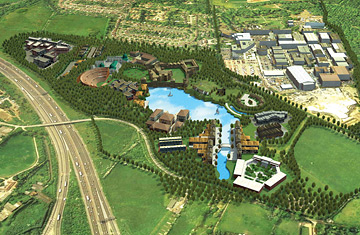
A computer generated image of Pinewood Studios shows the extension proposal known as "Project Pinewood"
Film sets — even the permanent ones — are by definition artifice. Sure, they look real enough from the outside, but inside, the fantasy evaporates into a maze of fake walls and uninhabitable spaces. But the make-believe reality of movie sets may soon merge with realty at Britain's iconic, 70-year-old Pinewood Studios.
As part of a planned 105-acre expansion, Pinewood Studios Group has conceived the ultimate gated community. Amid a mix of structures that would include a Roman Coliseum, a medieval, moated castle and several urban streetscapes that range from New York's Lower East Side, to Venice's canals, to suburban L.A., to a quaint European village, the studio wants to incorporate 2,000 to 2,250 actual residences. For example, the first and last buildings of the block of New York row houses would be left empty for interior shoots. But the middle ones would house real homes and apartments. "It would be no different than if you were living on a New York street and you had a filmmaker filming outside your door," explains CEO Ivan Dunleavy.
Space within the castle and other buildings would be set aside for shops, restaurants, gyms, possibly even a school. The Coliseum would double as a performing arts venue. A mock U.S. college campus would house a training center.
Why build a real community in a fake environment? "The benefits that accrue when you create these live/work clusters are pretty well proven. You can think of Silicon Valley as an example," says Dunleavy, who expects most buyers will be film industry employees, though the units would be available to anyone. Media reports set the project's cost at around $400 million, a figure Pinewood doesn't dispute but won't confirm. So another possible benefit could be to recoup costs by selling properties that almost certainly won't go cheaply. Moreover, the land in question — which Pinewood owns — is located within the greenbelt, a swath of rural land that rings London where development is usually prohibited. The addition of homes in a country battling a housing shortage could also bolster its planning application. It won't hurt Pinewood's argument, either, that the expansion will create more than 1,000 permanent jobs.
Since its creation in 1937 on the grounds of a 19th-century manor house just outside London, Pinewood has been used for some 1,500 movies — Great Expectations, Dr. Strangelove and Sweeney Todd among them. All the James Bond films, except Goldeneye, were shot here. In recent years, however, Pinewood and its nearby sister studio, Shepperton, have faced competition from low-cost Eastern European countries. Britain will never be an inexpensive place to make movies, but Pinewood hopes to remain competitive with this one-stop-shop concept, creating economies of scale by combing popular permanent sets with Britain's experienced, respected industry workforce. "It's not a pie-in-the-sky idea," says Iain Staples, an industry analyst at Clear Capital, an equity research firm, adding that the cost savings of Eastern Europe often prove illusory, because of inexperienced crews and tough filming conditions. "It can take twice as long to make a movie there."
But a one-stop-shop already exists — and it's called Hollywood. But Michael Gubbins, editor of Screen Daily, thinks the two film centers complement one another. "Only X amount of films can be made in Hollywood. And Hollywood isn't a cheap place to film, either." The British government recognizes the importance of the film industry to the economy. It recently enacted tax cuts for movies made here with a British component. The industry contributed nearly $9 billion to the British economy in 2006, according to the U.K. Film Council, an increase of 39% over 2004. But while inward investment from overseas filmmakers jumped 28% to nearly $650 million in the first half of 2007 compared to the same period in 2006, overall spending for the first six months was flat at around $900 million. The U.K. industry could also take a hit if the screenwriters' strike in the U.S. continues. Pinewood's already announced a $6 million loss of revenue for 2008 because the strike postponed filming of The Da Vinci Code sequel. The unpredictable nature of the movie business is why the studio has in recent years branched into television and commercial filming — only half its revenues now come from films. So it hopes that the planned permanent sets will appeal to TV producers, as well as to moviemakers.
Pinewood expects to start groundbreaking for the expansion within 18 to 24 months, if there are no planning-application hitches — though that's not guaranteed, given the greenbelt issue. If it remains on schedule, however, construction could be finished in three to five years. Then it'll be: Cue the real-estate agents.
